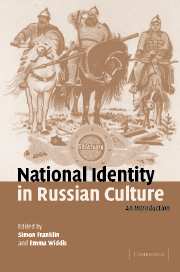Book contents
- Frontmatter
- Contents
- List of illustrations
- Notes on contributors
- Preface
- Note on the transliteration of Russian
- Map: The growth and contraction of Russia and its empire
- 1 ‘All the Russias …’?
- SECTION I IDENTITIES IN TIME AND SPACE
- 2 Russia in time
- 3 Russia as space
- SECTION II CONTRASTIVE IDENTITIES: ‘US’ AND ‘THEM’
- SECTION III ‘ESSENTIAL’ IDENTITIES
- SECTION IV SYMBOLS OF IDENTITY
- Afterword
- Notes
- Selected further reading in English
- Index
3 - Russia as space
Published online by Cambridge University Press: 04 May 2010
- Frontmatter
- Contents
- List of illustrations
- Notes on contributors
- Preface
- Note on the transliteration of Russian
- Map: The growth and contraction of Russia and its empire
- 1 ‘All the Russias …’?
- SECTION I IDENTITIES IN TIME AND SPACE
- 2 Russia in time
- 3 Russia as space
- SECTION II CONTRASTIVE IDENTITIES: ‘US’ AND ‘THEM’
- SECTION III ‘ESSENTIAL’ IDENTITIES
- SECTION IV SYMBOLS OF IDENTITY
- Afterword
- Notes
- Selected further reading in English
- Index
Summary
Walking in Moscow in 1927, ten years after the Bolshevik revolution of 1917, the German philosopher and critic Walter Benjamin (1892–1940) was struck by a peculiar thing – everywhere he looked in the city he saw piles of maps for sale. As he recalled in his ‘Moscow Diary’: ‘Russia is beginning to take shape for the man of the people. On the street, in the snow, lie maps of the [R]SFSR, piled up by street vendors who offer them for sale … The map is almost as close to becoming the centre of the new Russian iconic cult as Lenin's portrait.’ Sixty years later, in Moscow in the late 1980s and early 1990s, it might have seemed that nothing had changed. At metro stations and in street kiosks, maps were once again a product of choice, piled up on makeshift tables for the consumer's perusal. As the Soviet Union collapsed in 1991, so there were new atlases of the new Russian Federation, and of the CIS (Commonwealth of Independent States). As Moscow's streets were renamed, shaking off their Soviet heritage, so new maps of the city itself were needed. Russia once again, and in a quite different context, was ‘taking shape for the man of the people’.
The obsession with maps and mapping in the 1990s was understandable. Just as the openness sanctioned by Mikhail Gorbachev's policies of perestroika (re-building) and glasnost (openness) meant a rewriting of history (filling in the ‘blank’ spots of official history), so it meant a rewriting – or re-drawing – of geography.
- Type
- Chapter
- Information
- National Identity in Russian CultureAn Introduction, pp. 30 - 50Publisher: Cambridge University PressPrint publication year: 2004
- 13
- Cited by

